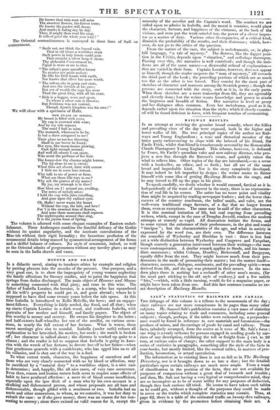RAILWAY RESULTS
Is an attempt at reviving the genuine broad comedy, where the follies and prevailing vices of the day were exposed, both in the higher and lower walks of life. The two principal topics of the author are Rail- ways and Young Englandism ; a roué and rhetorical member of the latter party endeavouring to elope with the beloved of his friend, SLIP Facile Frisk, whilst that friend is treacherously arrested by the Honourable Claude Plantagenet Young England. This scheme, however, is defeated by Fence, Sir Facile's quondam valet and now railway director, who pro- jects a new line through the Baronet's estate, and quickly raises the wind to relieve him. Other topics of the day are introduced,—as a scene with a bookseller, an editor, and so forth ; but all are of the same broad and improbable kind. Nor is the story completely developed. It may indeed be left imperfect by design : the writer seems to flatter himself with some idea of getting Railway Results on the stage, and he may intend to fill up the gaps in his piece.
To speak candidly, we doubt whether it would succeed, farcical as it is. Independently of the want of interest in the story, there is no representa- tion of real life in its scenes. The satire has no more point and vitality than might be acquired by reading newspaper leaders ; and the lower cha- racters of the country coachman, the ladies' maids, and valet, are the well-worn traditional stage farceurs, of a day that no longer knows them, even as exceptions. The same may be said of the other characters. It is this nominal imitation of life, but real copying from preceding writers, which, except in the case of Douglas Jerrold, renders the modern attempts at comedy so vapid. All dramatists imitate the forms, and to some extent the substance of their predecessors, in the plot and comic "intrigue"; but the characteristics of the age, and what in society is expressed by the word ton, are their own. The difference between the comedies of Wycherley and Sheridan is vast : there is less but yet a wide distinction between Wycherley and Congreve and Farquhar, though scarcely a generation intervened between their writings—the men were contemporaries. A similar remark applies to Steele, and his imme- diate successors; whilst Colman, Hoadley, Bickerstaff, and Burgoyne, equally differ from the rest. They might borrow much from their pre- decessors in the mode of presenting their matter ; but the matter itself— characters, manners, dialogue, sentiments, and the pervading spirit—were derived from life, and the age was pictured in their scenes. In the mo- dern plays there is nothing but a rechauffe of other men's meats, Cfor the most part sticking to the old style of cookery,) and a few satiric "hits,"—which, with a little turning, would do for a magazine paper, or might have been taken from one. And this last sentence contains an ex- act description of Raibvay Results.


























 Previous page
Previous page